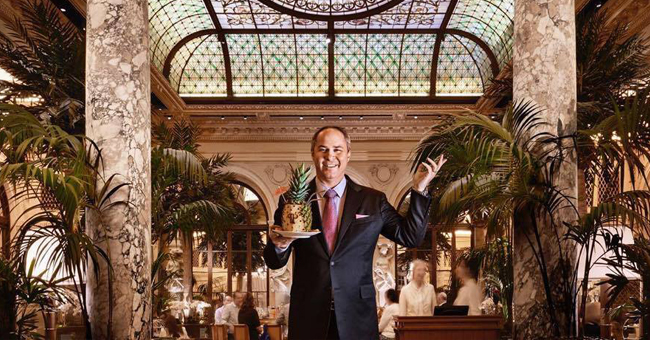Brian Van Flandern has worked in one of the finest Michelin-starred establishments in the world. Now, his cocktails are served in over forty countries. As a professional beverage consultant, Brian made the leap from working behind the stick to becoming the sole proprietor of his own consulting firm years ago. “I got to a point where, like a lot of us, my knees were shot, I didn’t have my speed anymore, and I really wanted to move into something that was fulfilling as an artist, as a mixologist, but was actually lucrative,” he says. “As we get older, we’re looking for the next big adventure and challenge, and for me it was beverage consulting.”
Needless to say, the transition was a success: Van Flandern has become one of the top consultants in the field, with clients ranging from the Plaza Hotel in New York to the world’s most luxurious cruise ship. So, we asked him to share some of his tips and advice from the intimidating, yet liberating front lines of self-employment. If you’ve ever considered branching out on your own but aren’t sure how to net clients, which services to offer, or how to price out a quote, read on for some of his invaluable wisdom — and watch his talk in its entirety right here.
First of all, what is a consultant and why do we need them?
Van Flandern explains that the role has changed over the decades. “Historically, a consultant has been someone who was hired to basically take care of all the subtle minutia required behind a bar and do it in the most cost-effective fashion possible,” he says. “Beverage consultants were brought in to put in the soda guns, find sour mix, get grenadine and Rose’s Lime Cordial — to stock the bar with all those things mixologists like to avoid.”
But, in the last 15-20 years, there’s been a big shift. “Today’s clients have tuned in to the craft cocktail movement; they’ve tuned in to the fact that people want fresh ingredients and original, innovative recipes, so they’re hiring mixologists to be their beverage consultants,” he says. “It doesn’t do you any good to have a great cocktail list if the bartenders aren’t executing them. It’s a very easy sell to transition them into telling we need to do some spirits education; to teach the bartenders not only about every single spirit behind their bar, but also how to balance them, how to use the spirits properly, how to use their tools properly.”
The first step: acquiring a little street cred
Van Flandern says that the first thing you want to do before embarking on your consulting journey is to build up your credentials. “That means leveraging whatever great successes you’ve had in your bartending career,” he says. “In addition to learning how to build recipes, work on innovation and original recipes, and start creating a database of cocktails for yourself. You want to know all of your classics, but you also want to create your own identity: things you’re known for. Any press you get, you want to take advantage of that.”
Become your own PR machine
Now is not the time to be humble. It’s key to capitalize on any press you’ve had — and to drum up more. “You are your business, you are your brand. Boast on your accomplishments. Start creating a press book. Any time your name appears in print, even if it’s just in the context of the place where you work, or someone writes an article about a cocktail you created, keep that article,” he says. If you aren’t camera shy, he also recommends saying yes to any television appearance opportunity that comes your way. “It’s not mandatory but it certainly helps when trying to sell yourself to a client.”
Never turn down work in the beginning
Even if it might not seem like a perfect fit at first. “If someone offers you a job and it’s something that’s not particularly in your wheelhouse but they’re meeting your asking price, sometimes you just have to do a little research and jump right in,” he says. “You always want to under-promise and over-deliver. I would recommend in the early stages never turning away a job.”
But don’t quit your day job just yet
Why? Well, you still have bills to pay, and it takes time to build up a steady business. “In the beginning, my recommendation is that you get jobs as they come along, you ask for your shifts off and you do those events,” says Van Flandern.
Figure out what services (and extras) you want to offer
Van Flandern offers a host of different services for potential clients, based on what might benefit them and what he happens to specialize in. “An extra added value that I offer my clients is to say, we will create the top 10 or 20 most commonly ordered cocktails that your guests will typically ask for beyond your cocktail list, whether that’s Manhattans and Negronis or piña coladas and Bloody Marys — we’ll standardize those recipes and teach them the fundamental principles of balance so they can consistently make the same recipe taste great every time.”
He also brings his own fine dining experience to the table, offering Michelin 3-star beverage and dining standards, “which a lot of my clients at the higher end really want their servers and bartenders to know,” he says. Education on lability and social responsibility training (like how to diffuse situations and mitigate the exposure to a liability situation) comes up, as well as training for professional integrity. “It’s our responsibility to eliminate ego behind the bar,” he says. “When someone comes into our craft cocktail lounge and orders a Cosmopolitan, we don’t give a derisive snort; we don’t roll our eyes, we don’t mutter under our breath. We say ‘absolutely,’ and we make them the best damn Cosmopolitan they’ve ever tasted.”
Learn how to talk to your clients — and more importantly, how to listen
While money might seem like the most important topic to tackle first, Van Flandern recommends saving that for last. “You want to understand what their expectations are: the scope of work that they’re expecting from you, so you can give them an accurate and intelligent price quote. That starts by listening to your client. The first thing you want to ask is, can you tell me about your bar, your clientele, what your vision is for your bar? Then you sit back, you shut up, and you listen,” he explains.
Learn how to seal the deal
Your expertise and experience won’t get you very far without a little hustle. “In no uncertain terms, if you’re going to work for yourself, you need to sell your credentials but you also need to seal the deal,” he says. “Paint the picture, tell them what it is you’re offering them, what kind of added value you give them.” He breaks it down for his clients by explaining that a natural byproduct of making a great craft cocktail is using less alcohol per cocktail and, thus, ending up with a better tasting cocktail that’s cost effective. “Our liquor costs go down, our check averages go up, and bartenders are making more money, and we can charge a premium because we’re using quality ingredients,” he says. “The guest wins, the house wins, and the bartender wins. This is where added value comes in. They start to see that you can charge a premium for a consulting fee, but they’re going to go ahead and get that money back in short order.”
Determine your rates and try to stick to them, but prepare to offer some flexibility
Van Flandern says that, unsurprisingly, one of the most common questions he gets is from people just starting their consulting work and not sure what to charge for a one-off event. “In the beginning, you want to seal the deal; you want as many of this word of mouth and referral as possible. You really want to underpromise and overdeliver and give them an exceedingly positive experience so that at the end of the day, they feel like it was well-worth the money spent,” he says. But that shouldn’t mean taking a cut from what you’d normally make on a shift. “My recommendation is, when you’re starting out, figure out how much you get paid on your best shift of the week. I would say it would be a good idea to double whatever you’d make on a typical best bar shift of the week, figuring that you have to give up a shift, and you don’t want to break even,” he explains.
“As a general rule, when people are looking for a consultant, they understand that there’s a premium attached,” he adds — plus, self-employed people need to account for other expenses like health insurance and higher taxes. “Be smart about it. It’s a very delicate thing. I’ve had clients come in and say, ‘wow, that’s way too expensive for me, thanks, goodbye’… and I’ve had other clients sit there and say, ‘oh yeah, no problem,’ without any hesitation or any haggling. You don’t necessarily want to get in a haggling situation: your prices are what your prices are. But when you present that price to them, I personally present a price quote based on a scope of work and what my client’s expectations of me are.”
What to do when your quote is too high
“First thing is, you have to read them right away,” says Van Flandern: is all hope lost, or is there room to negotiate? “At that point you sit there and say, ‘here’s the deal. The package is what it is, it’s cost effective, and it will pay for itself in short order, but if you want to reduce the number of services that I’m offering, we can cut it down,’” he says. “I give them a price quote, and if they can’t afford it or they’re balking, then you can talk about reducing some of the services you’re offering and staying within their budget.”
Know your worth
Of course, not everyone will always be able to afford a fair market rate — and that’s okay. “Sometimes I’ve stuck to my guns and said, I’m so terribly sorry but business is good, and I’m in demand, and my price is what my price is, but I do promise you it’s worth it, I have referrals and references, and I strongly encourage you to crunch some numbers,” he says. “You’ll see that it’s well worth it because when you execute the program properly, your liquor cost goes down, your check average goes up, and you can generate press and PR for yourself. More often than not, people will see the added value in that and say, ‘okay, I can’t afford not to hire this guy.’ It’s very important to be able to sell the vision, and in no uncertain terms, you have to become a bit of a salesman — and that means you have to close the deal.”
Expect the “feast or famine” of self-employment and prepare accordingly
As a self-employed person, you’re bound to encounter lean months where it seems like nothing is coming your way, and months where all sorts of clients and business come out of the woodwork. The key is to plan accordingly, have a few trusty colleagues you’re comfortable referring extra business to, and never, ever flake on a client. “Never bail on your commitments, always follow through on your promises, and try not to turn down any work in the beginning,” he says. “As your business becomes bigger and bigger, as you’re able to pay your rent from month to month and even have a little backing or padding in the bank, and you start making real money, then you can start paring back on your bartending shifts and eventually eliminate that altogether and become sufficient and self-sustaining just on your consultancy. For me, that was a big deal.”
Partnerships can be a great anchor gig with steady, consistent pay
One way to combat that “feast or famine” dynamic? Anchoring yourself with a steady, well-paying, dependable gig. Van Flandern has found those in the form of long-term partnerships, usually with large corporations. “Most of these corporations have deep pockets and they want somebody to sustain that program, to keep ahead of current trends, to keep the cocktail list seasonal and fresh. So there’s an opportunity there to say, ‘well, we can certainly come in and do this program, sell the dream, talk about your services, but another option is to become a partner with you.’” Partnerships typically involve an ongoing relationship with annual fees, which helps with that whole bill-paying thing too. He puts it in no uncertain terms: “if you’re in the beginning, you want to work toward partnerships.”
Design a website for yourself (or pay a professional)
Even if it’s just a minimalist landing page with contact information, a bio and a description of the services you offer, having a website is crucial for building your business and spreading the word. “My first website was super amateur hour, but it was a way that, when I had a client, I could direct them to it and they could see what I offered,” he says. “It’s definitely worth it. Keep it short and sweet. If you hire a professional web designer, great idea, but you definitely want to be able to add on or subtract. You want to be very concise about what it is you’re saying and what it is you’re offering. Don’t try to be everything to everybody.”
Protect yourself by incorporating your business
Of course, anyone looking to branch out into running their own business should seek advice from a qualified tax and/or law professional, but this is simple advice: when you’re starting your business, become incorporated. “Setting up an S-Corp is relatively inexpensive,” he says. “An incorporation is very, very important. It protects you from personal liability if something goes wrong, if someone over-drinks. If you get sued, it protects you personally from owing someone for the rest of your life.”
Finally: Don’t solicit consulting work at your bartender job, and don’t be a jerk
It should go without saying, but be respectful of your current employer and your coworkers while making this transition. Van Flandern cautions against chatting with people about your consulting at the bar, and suggests keeping business cards on-hand for this purpose. “If someone comes to you at work and says, ‘do you consult?’, if you have a business card, that’s great. You can say, I do consult, but I don’t really talk about that at work, so here’s my card — you’re welcome to reach out to me and I’d be happy to discuss that with you,” he advises. And for many starting out, the first one-off consulting gigs will require taking time off to work private events. Take your time off, but don’t bail on a shift at the last minute or call in sick. “Just ask for the day off, don’t call in sick, don’t be a jerk — if you know in advance, as far in advance as you can, take the time off and do that gig and get right back to it,” he says. And, over time, it just might build up to the point where you’re considering making the leap for real. “If you’ve got a really great consulting gig, like a two-week job or more, and it’s going to cover a couple months’ rent, then you’re making that leap from one to the other.”




